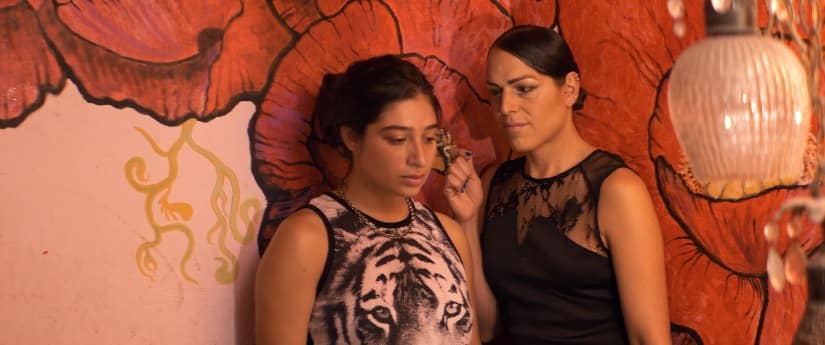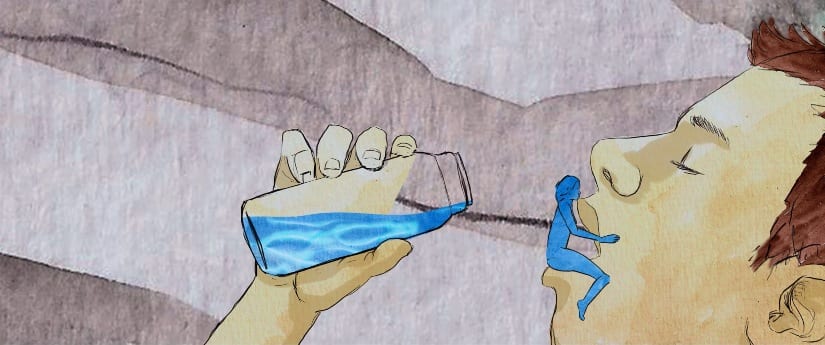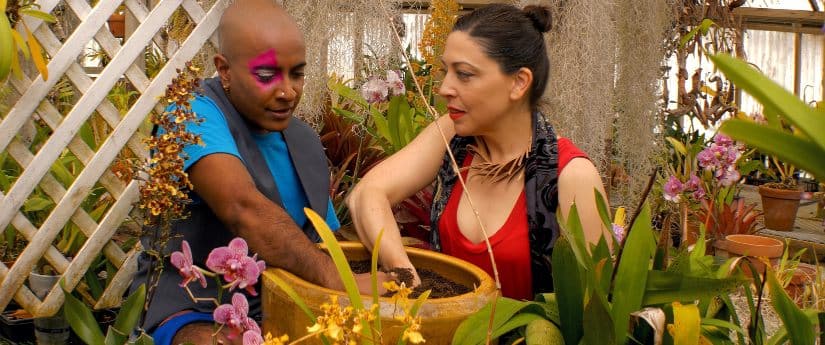A young character invokes spirits to teach a bully a lesson about respecting those who are different. Another casts a celestial spell on a sleazy politician to make America’s wishes come true. A grandma proficient in martial arts teaches her granddaughter that the grace of wind is a powerful tool when faced with hard reality. These are just three of the seven stories that make up TRANSFINITE, an omnibus of sci-fi stories written by and starring trans and gender non-conforming artists. It’s a trans-futuristic endeavour featuring stories that transcend time and space, strung together with animation. The languages used in the film include English, Spanish, Swahili, and Navajo. In director Neelu Bhuman’s words, TRANSFINITE is a first-of-its-kind collective social justice feature film that brings together the creative voices and talents of trans and gender diverse artists and filmmakers of color. The Indian-born and London-based independent artist-filmmaker is known for exploring social and political themes, along with race, gender, sexuality, and class. Bhuman’s award-winning film FU377 (2014) was a stop-motion animation movie that juxtaposed a young bisexual person’s heartbreak with the revival of Section 377. [caption id=“attachment_7119431” align=“alignnone” width=“825”]  A still from BAHARI[/caption] Bhuman’s fourth film was screened during an artistic preview at the Kochi-Muziris Biennale in Kerala and most recently at the Bangalore Queer Film Festival. It was also one of the feature films screened at Outfest Los Angeles 2019 in July. Excerpts from an interview with the director: Why did you choose the omnibus as a storytelling format? Do you believe it gets across the message better? I chose the format of an omnibus to reflect the prismatic nature of our multicultural communities while providing many talented artists a platform to create and nurture their filmic art. In the current Western context where multiple races, sexualities, gender identities, classes are commonplace, I believe this format gracefully allowed for the exploration of the intersections of the aforementioned categories. Audre Lorde said, “There is no such thing as a single-issue struggle because we do not live single-issue lives.” TRANSFINITE’s storytelling medium not only allows the filmic expression of multiple messages coming from lives living layered struggles, but also allows for different screenwriters from varied experiences to speak their truths. Not only is the writing, cast, and crew originating from this varied experience, but also the poetic and musical aesthetics of the film. There’s the Navajo and Swahili poetry by Navajo Nation’s poet laureate and author, Laura Tohe, and London-based Kenyan musician Sharon Musyoka. The music is by brilliant women and transfemme artists like ‘Neda’ by Snipah Wolf, ‘Azaadi Is Freedom Is Fate’ by Kohinoorgasm, ‘Karma’ by Jade Elektra, ‘Mixes’ by Jasmine Infiniti, ‘Cómo Hacer?’ by Diana Gameros, and ‘Beija Flor’ by Jessica Lauren. The animations were meticulously brought to life by a filmmaker who is an LA-based queer woman of color, Pamela Chavez. [caption id=“attachment_7119441” align=“alignnone” width=“825”]  A still from SHAYLA[/caption] The shorts explore the themes of romance, comedy, the revenge of childhood bullies, family and relationships, and politics. Was the intention to explore familiar themes, even if presented in an unusual setting? It is the norm for trans and gender diverse narratives to be erased and only to be talked about in the context of trans murder, death or ridicule. The fact that TRANSFINITE is considered an unusual setting is a testament to the dearth of images that center gender diverse experiences on screen. This film centers trans and gender diverse characters by placing them in positions of power, wisdom, magic and inner light, celebrating the multidimensional humanness of the characters. The familiar universal themes such as acceptance, finding humility, self-doubt, shame, fighting for justice emerged naturally, given this power to be human. What do you hope is the message people take away from TRANSFINITE? I want trans and gender diverse people to feel seen and celebrated in a new way. I want everyone else to accept gender in all its magnificent mélange, do their part in stopping violence against trans and gender diverse people, question their own prejudices, and actively support our communities. I want financiers — both individual and institutional — to be blown away by the imaginative, playful, and fresh approach to queer filmmaking and consider funding films that center authentic voices of trans and gender diverse people. More immediately, I want TRANSFINITE to be acquired for distribution and seen around the world. [caption id=“attachment_7119451” align=“alignnone” width=“825”]  A still from MAYA[/caption] Any plans of getting it back to India or giving it a mainstream release across the world? I would love for it to screen all over in India. TRANSFINITE has been a super hit at all the film festivals it has travelled so far, but the film industry itself is lagging behind when it comes to seeing the significance of this work. My hope is that there is a group of distributors out there who will embrace the film, market it and bring it to nuanced art and activism-loving audiences across the world. What’s next in the pipeline for you? I am currently developing two feature films, one set in India and the other set in three countries in Europe. I have faith that TRANSFINITE’s success will help me acquire the support I need to bring these works to screen.
Neelu Bhuman, the director of TRANSFINITE, says it centers queer characters by placing them in positions of power, wisdom and magic. The sci-fi omnibus has been screened at the Kochi-Muziris Biennale in Kerala, the Bangalore Queer Film Festival and Outfest Los Angeles 2019
Advertisement
End of Article


)
)
)
)
)
)
)
)
)



